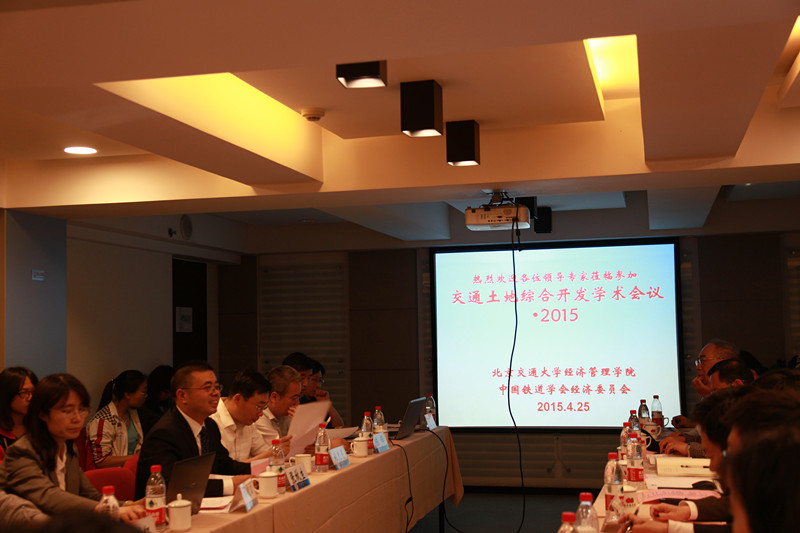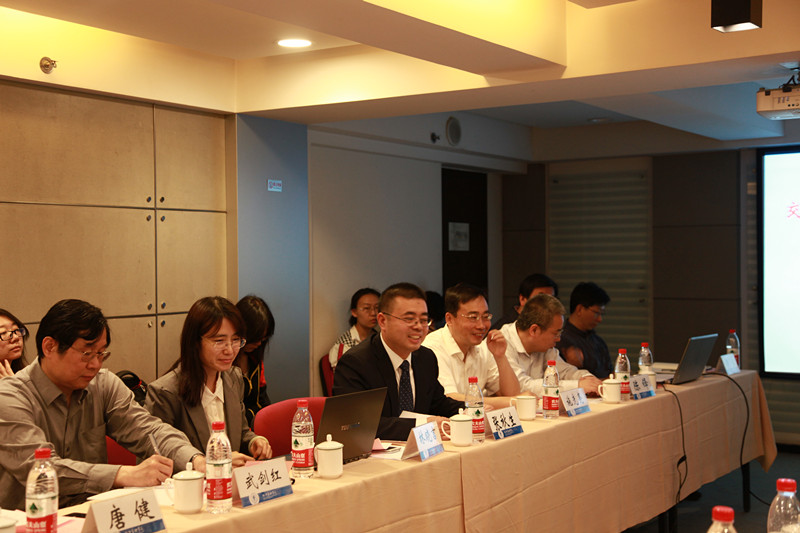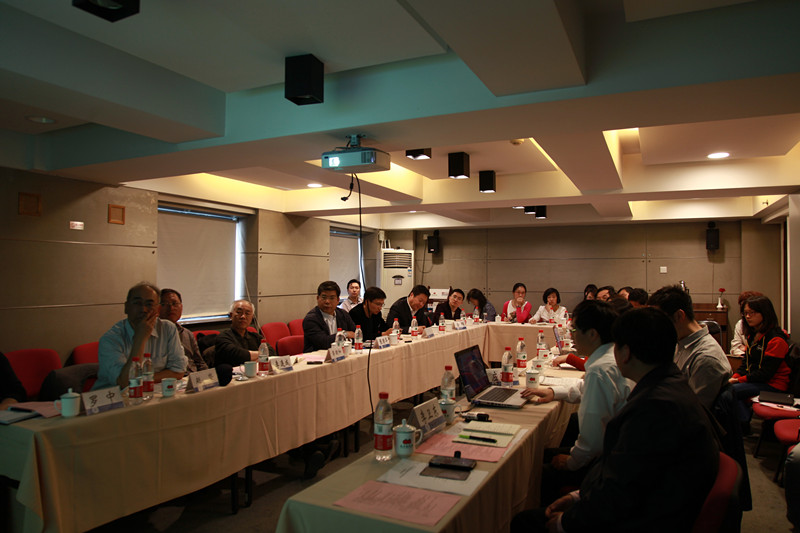From 9:00 am to 5:00 pm on April 25, 2015, Academic Meeting of Integrated Development of Transportation Land 2015 was held in the 4th meeting room of Hongguoyuan Hotel of Beijing Jiaotong University. The meeting was sponsored by School of Economics and Management of Beijing Jiaotong University, China Railway Society and Chinese Society of Technology Economics, organized by Sub-School of Economics of School of Economics and Management of Beijing Jiaotong University, Committee of Economics of China Railway Society, Institute of Transportation Economy of Beijing Jiaotong University, and Professional Committee of Transportation Technology and Economy of Chinese Society of Technology Economics, co-organized by Research Center of Basic Industry of Beijing Jiaotong University, Beijing Research Base of Transportation Development, Beijing Research Base of Industrial Safety and Development, Research Center of Urbanization of China of Beijing Jiaotong University, and Research Center of Transportation Economy of China of Beijing Jiaotong University. The meeting invited experts and scholar from Institute of Integrated Transportation of Research Center of City and Small Town of National Development and Reform Commission, Institute of Comprehensive Transportation of National Development and Reform Commission, Department of Comprehensive Operation and Development of China Railway, China Land Surveying and Designing Institute, Department of Land and Real Estate of Beijing Railway Division, Beijing Traffic Information Center, China International Engineering Consulting Corporation, Beijing Infrastructure Investment Corporation, Japan Gifu University, etc. Professors Rong Chaohe, Zhao Jian, Lin Xiaoyan, Wu Jianhong, Fenghua and Associate Professors Li Weidong and Li Hongchang attended the meeting.
Prof. Shi Xianliang, Vice President of School of Economics and Management of Beijing Jiaotong University, hosted the meeting. Prof. Zhang Qiusheng, President of School of Economics and Management of Beijing Jiaotong University addressed on opening ceremony on behalf of sponsors. He welcomes all of the delegates and elaborated disciplinary advantages and social serving aims of School of Economics and Management. Prof. Lin Xiaoyan, President of Sub-School of Economics, Secretary-General of Committee of Economics of China Railway Society and Director of Professional Committee of Transportation Technology and Economy of Chinese Society of Technology Economics, addressed on behalf of organizers, hoping the participating experts speak and suggest freely as a way of practicing the soul of pIndependent personality and free spiritq of modern universities. Delegates of each unit spoke one by one.
Prof. Zhao Jian, Director of Research Center of Urbanization of China of Beijing Jiaotong University hosted academic presentations in the morning. Presentations in sequence were as follows: pOpportunities and risks of railway land development seeing from overseas phenomenaq by Prof. Rong Chaohe of School of Economics and Management, pIntegrated development of transportation landq by President Zhang Guohua of National Development and Reform Commission, pSeveral problem of integrated development of railway traffic in Chinese citiesq by Senior Engineer Yang Yongping of China International Engineering Consulting Corporation, pIntegrated management and development of Beijing railway trafficq by Prof. Liu Jinling of Beijing Infrastructure Investment Corporation. Associate Prof. Li Weidong, Vice President of Sub-School of Economy hosted academic presentations in the afternoon. Presentations in sequence were as follows: pLand development cause as an accumulation of good capital of railway enterprise: simultaneously talk about the Japanese reform of state-owned railway and land capital valueq by Prof. Ying Jiangqian of Japan Gifu University, pEarly American railway investment system with double orientation of private land: defects and warningq by Prof. Lin Xiaoyan of Beijing Jiaotong University, pDiscussing problems in practice of integrated development of railway land: take Beijing-Tianjin-Heber zone as an exampleq by Senior Engineer Jin Hui of Beijing Railway Division, pInstitutional factors in integrated development of railway trafficq by Associate Prof. Li Hongchang of Beijing Jiaotong University.
In the meeting, Prof. Rong Chaohe said that the railway should bear the function of figuring metropolitan, starting with comparison analysis of cluster development of Tokyo, Japan and expanding development of Los Angeles. Railway enterprise should be in close alliance with real estate developers and become developing entity of class one and a half as soon as possible. Current management system of railway and urban administration of China donot fit needs for development of metropolitan, and it needs to create cross-region coordination mechanism as soon as possible to promote the level and quality of urbanization of China. Prof. Zhao Jian said that development of city railways served urbanization and development of railway traffic was also for promoting industrial efficiency. Director Li Liancheng of Institute of Comprehensive Transportation of National Development and Reform Commission said that current joint development of railway land didnot have railway stations organically combined with cities because of short of planning. He took Lanzhou-Xinjiang railway line as an example to explain his opinion. Prof. Ying Jiangqian of Japan Gifu University introduced experience of JR Company and Capital Railway Company of Japan, and said that big cities were bases of accumulation of good capital of railway enterprise and railway enterprises should bear more urban traffic. Prof. Lin Xiaoyan analyzed the deep defects of model of pprivate investment plus government grand of landq in early period of American railway construction, and put forward three warnings for reform of railway investment system: (1) consciousness of risks, (2) consciousness of market orientation, and (3)consciousness of cooperation and win-win. Senior Engineer Jin Hui of Beijing Railway Division said that in todayos railway land development there were such problem as no consistency of local governmentos administrative policies, short of restrain of administrative entities, free occupation of railway ownership, and ineffective provision of allocated land. Associate Prof. Li Hong Chang said that there were problems of institutional innovations in national, regional and urban railways, and took innovation in the development of intercity railway in the Pearl Delta as an example to explain.
Finally, Prof. Wu Jianhong made concluding remarks. He said that the meeting was held highly in time, meeting peopleos needs of deeply discussing issues of pwhat is, why is and how to doq integrated exploitation of transportation land. The issue of integrated development of transportation land is marriage, not wedding ceremony, and it needs all sides build concept of sharing of long time interest and risks.
The Academic Meeting of Integrated Development of Transportation Land 2015 focused on hot issues in development of railway and urban railway traffic. It had not only top experts and scholars in the academic field of transportation land development but also entities of railway enterprises and railway traffic companies, fully demonstrating link of theory and practice. Meeting delegates had comprehensive discussions on relation between railway and city, metropolitan, commuter railways, PPP and its realizing model, railway land development experience of Japan, railway traffic development experience of Beijing, Shenzhen policy of transforming price of railway land to share, realistic obstacles in the development of railway traffic and resolving countermeasures, etc. The meetingos achievement was fruitful and highly endorsed by participating experts and scholars. It is believed that the meeting will have a huge promoting effect on the cause of railway traffic and integrated exploitation of land. Meeting organizers said that they would hold a series of meetings to continue deep discussion on issues in relative fields and play a role in the successful implementation of national macro strategies.









